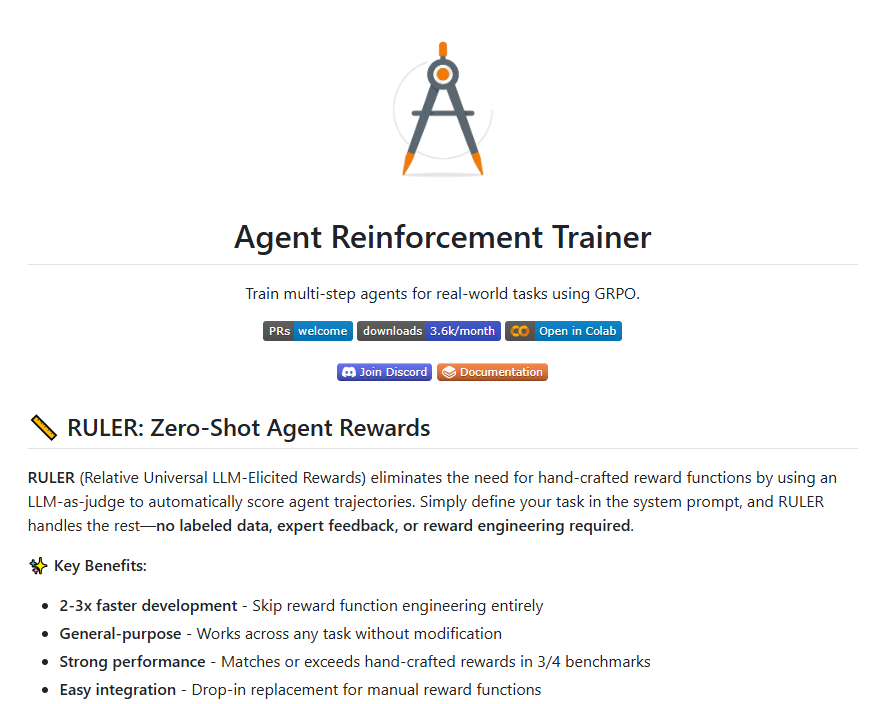The rapid development of artificial intelligence technology has brought new opportunities for training intelligent agents. Recently, an open-source reinforcement learning framework called ART (Agent Reinforcement Trainer) was officially released, attracting widespread attention from the developer community. By integrating GRPO technology, the framework provides convenient tools for Python developers to train AI agents to perform multi-step tasks such as email search and game control.
ART Framework: A New Tool for Reinforcement Learning
The ART framework focuses on improving the performance of AI agents through reinforcement learning (RL), enabling them to learn from experience and optimize task execution. ART allows developers to seamlessly integrate reinforcement learning into Python applications, suitable for various scenarios, including email retrieval, game AI development, and other tasks requiring complex decision-making. The framework particularly recommends using small models like Qwen2.5-7B due to their efficiency and flexibility, making them ideal for driving small-scale tasks. ART supports multiple language models such as Qwen2.5, Qwen3, Llama, and Kimi, providing developers with a wide range of choices.

With ART, developers can build long-running agents capable of handling multi-turn interactions, recursive calls to sub-agents, or compressing historical records. This flexibility makes ART an ideal tool for both personal projects and enterprise-level applications.
Easy Integration, Developer-Friendly
ART is designed with ease of use and modularity in mind, adopting a client-server architecture that significantly lowers the barrier to entry. The ART client integrates seamlessly with existing codebases, allowing developers to add reinforcement learning capabilities with simple Python commands. Installing ART requires running the following command:
```bash
pip install art
```
The ART server handles complex training and inference processes, supporting operation on local GPUs or ephemeral GPU environments in the cloud, so developers don't need to manage the underlying training services deeply. ART also integrates with platforms such as W&B, Langfuse, and OpenPipe, offering powerful observability and debugging features, helping developers monitor the progress of agent training. Official example notebooks and detailed documentation cover a variety of scenarios from email retrieval to game tasks, helping developers get started quickly.
Multi-Scenario Applications, Unlocking Potential
ART demonstrates strong application value in multiple fields, especially in the following scenarios:
- Email Search and Automation: Agents trained by ART can efficiently complete multi-step email retrieval tasks, quickly locate target emails, and improve work efficiency.
- Game Development: Developers can use ART to train AI agents to learn independently in complex game environments, such as implementing intelligent decision-making in Atari games or custom scenarios.
- Multi-Agent Collaboration: ART supports recursive calls to sub-agents and multi-turn interactions, making it suitable for developing complex multi-agent systems.
Based on the GRPO algorithm, ART collects data by executing multiple rollouts in parallel and iteratively trains using the latest checkpoints, ensuring model stability and efficiency in long-term tasks. ART is compatible with most causal language models supported by vLLM and HuggingFace Transformers, providing developers with high flexibility.
A New Chapter in Agent Development
AIbase believes that the release of the ART framework brings new possibilities for AI agent development. Its modular design and optimization for small models allow medium and small teams and individual developers to quickly build high-performance agents, breaking down the technical barriers of traditional reinforcement learning frameworks. The open-source nature of ART further promotes community collaboration, and it is expected to inspire innovative applications in more areas in the future.
Currently, the ART framework is in active development, and the official team encourages developers to contribute code or suggest improvements via GitHub to jointly enhance this ecosystem. Developers can access the ART GitHub repository (https://github.com/openpipe/art) to obtain the latest documentation and examples and quickly explore its potential.
Future Outlook: Integration of Multimodal and Complex Tasks
The ART development team stated that future plans include expanding framework functionality to support multimodal data processing and ultra-long context reasoning, meeting more complex task requirements. The flexible architecture of ART allows developers to customize training parameters and inference engine configurations, offering possibilities for diverse application scenarios. Whether for individual developers or enterprise teams, ART will become a powerful tool for building intelligent agents.
Project Address: https://github.com/OpenPipe/ART
